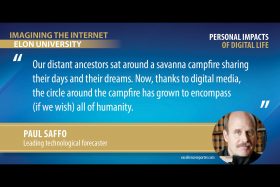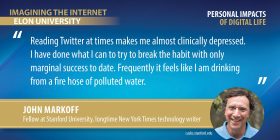A survey by Elon's Imagining the Internet Center and the Pew Research Center gave leading technology figures a chance to talk about the ways their lives have been changed.

The latest report in a series on the “future of the internet” conducted by Pew Research Center and Elon University’s Imagining the Internet Center offers anecdotes from technology experts, scholars and health specialists on their personal experiences with digital life. The report shows that a major share of experts extol the benefits of connectivity and easy access to knowledge in their everyday experiences. But some rue digital life’s health-threatening qualities, loss of privacy and diminishing trust.
The anecdotes are drawn from an early-2018 non-scientific canvassing of 1,150 experts on the future of digital life and well-being. Participants were asked to “share brief personal anecdote about how digital life has changed your daily life, your family’s life or your friends’ lives in regard to well-being – some brief observation about life for self, family or friends. Tell us how this observation or anecdote captures how hyperconnected life changes people’s well-being compared to the way life was before digital connectivity existed.”
The majority shared stories about the positives of digital life:
- Glorious connectedness: Many said the internet’s greatest boon to individuals is the ability to reach out and connect directly with friends, family, colleagues, knowledge, education, entertainment and more anywhere globally at any time in a nearly free and frictionless manner.
- Invent, reinvent, innovate: Digital tools enable people to invent or reinvent their lives and careers and innovate through wide networking with people and information that allows them to develop businesses, find the perfect job and meet soulmates, colleagues, new friends and fellow interest-sharers.
- Life-saving advice and assistance: People can tap into and share medical, safety and health resources and support at a moment’s notice – the internet is crucial to personal health and a game-changer for people engaged in child and elder care.
- Efficient transactions: These experts also hailed the way the internet revolutionizes other logistics and experiences. They cited benefits including accessing online education, researching purchases, finding the best options for anything, making quick-hit social connections, planning trips, or coordinating activities – which allow people to be more mobile, savvy and globally enriched.
“Among the many wonders they note are nearly instant and easy connection to family, to friends, to career, life, shopping and entertainment options and the ability for anyone to share information globally, including tapping into amazing global-navigation resources,” said report co-author Janna Anderson, director of the Imagining the Internet Center and professor in Elon’s School of Communications.
 Some of these experts, though, wrote about negative impacts – experienced by themselves or by those around them. Among those themes:
Some of these experts, though, wrote about negative impacts – experienced by themselves or by those around them. Among those themes:
- Connectedness overload: Low-friction instant access to nearly everything, anytime, anywhere is causing stress, anxiety, sleeplessness and loss of patience. Some noted that they witness people missing out on or diminishing important face-to-face social interactions and experiences. Some also noted that work demands and entertainment lures tug away at users 24/7/365 and that there is a loss of attention to “real life.”
- Trust tensions: The business model of internet platforms is mostly built on an attention economy that rewards addictive products that heighten users’ emotions and perpetuate polarization. In addition, there are concerns among experts about issues of security, surveillance and privacy.
- Personal identity issues: Self-promotion, narcissism, click bait, trolling, propaganda and pressures to conform have become dominant in social networks, causing some individuals to experience a loss of self-confidence and self-esteem. This encourages some to lose faith in others and adopt a negative world view.
- Focus failures: Digital life fosters shallow engagement with information as people glide through multiple information streams daily, taking little time for reflection. People have a diminishing capacity to concentrate well enough to stay on task and do long-term, deep-dive thinking.
“It is striking how the personal stories of these experts so closely align with the experiences of everyday internet users,” said Lee Rainie, director of internet and technology research at Pew Research Center and a member of Elon’s School of Communications National Advisory Board. “Their experiences and their fears are almost globally representative. Even as they enjoy the benefits of connectivity and access to knowledge instantaneously, they see problems that are very familiar and urgent. They note that digital life can be distracting, diverting, easily manipulated by powerful actors and deeply distrusting of the essential things that make life meaningful.”
Here is a sampling of quotes from experts about positives they have experienced in digital life:
- Louis Rossetto, founder of Wired magazine, said, “Digital technology is so broad today as to encompass almost everything. No product is made today, no person moves today, nothing is collected, analyzed or communicated without some ‘digital technology’ being an integral part of it. That, in itself, speaks to the overwhelming ‘value’ of digital technology. It is so useful that in short order it has become an integral part of all of our lives. That doesn’t happen because it makes our lives miserable.”
- Larry Irving, co-founder of The Mobile Alliance for Global Good, wrote, “There is almost no area in which digital technology has not impacted my and my family’s life. I work more from home and have more flexibility and a global client base because of digital technology. I monitor my health and keep my physician informed using data technology. My wife has gone back to a graduate school program and is much more connected to school because of technology. My entertainment and reading options have exploded exponentially because of new technologies. Use of home speakers, Internet of Things, AI and other emerging technologies is just impacting my life and likely will become more central.”
- Mike Liebhold, senior researcher and distinguished fellow at the Institute for the Future, wrote, “Almost every member of my family regularly uses the internet to inform or improve aspects of their well-being: diet, fitness, health, social interaction with family and friends in person and online, education, entertainment, employment, commerce, finance and civic engagement.”
- Paul Saffo, a leading Silicon-Valley-based technological forecaster and consulting professor in the School of Engineering at Stanford University, said, “I have had an email address on my business card since 1982, and carry enough electronics on my person to get nervous in lightning storms. Digital connectivity has become like oxygen, utterly essential to my research. The net effect of these innovations has been to tie me more closely to other individuals and extend my interpersonal connections well beyond the pre-internet links of in-person interactions and telecommunications. I have friends – close friends who I have known for well over a decade and with whom I communicate nearly every day. We have never met in-person.”
- Stowe Boyd, managing director at Work Futures, said, “The simplest anecdote is about keeping a family messaging chat open with my wife and children. My kids – both in their 20s – live in Brooklyn, which is close to where we live, but over an hour away. However, we all participate in the chat, often several times in a day. We share pictures, links, stories, plans. It is simply much lower friction than how I managed to remain in contact – or didn’t, really – with my parents when I was in my 20s.”
Here is a sampling of quotes from experts about negatives they have experienced in digital life:
- John Markoff, a fellow at the Center for Advanced Study in the Behavioral Sciences at Stanford University and longtime technology writer at The New York Times, said, “Reading Twitter at times makes me almost clinically depressed. I have done what I can to try to break the habit with only marginal success to date. Frequently it feels like I am drinking from a fire hose of polluted water.”
- Carolyn Heinrich, professor of public policy, education and economics at Vanderbilt University, wrote, “If someone would have told me I was going to spend 10-12 hours in front of a computer most days to do my job, I would never have chosen my current occupation, but it seems like most jobs these days require constant computer use… The consequence for me physically is that I am sitting too much and I have chronic back and neck pain, as well as tendonitis, from repeated motion and leaning into a computer monitor. I also worry that social media like Facebook, Twitter, etc., are increasing social anxiety and are as destructive as they are potentially beneficial in their facilitation of communications.”
- Kat Song, communications and digital strategy director at the American Association for the Advancement of Science (AAAS), wrote, “My kids are 14 and 12. Their social and emotional lives have been negatively impacted because they tend to seek less real-life interaction with friends because they can so easily interact with them online.”
- Dana Chisnell, co-director of the Center for Civic Design, wrote, “Being online all the time is stressful and distracting… There are too many channels running concurrently, and it’s too hard to keep up. I feel unfocused all the time.
- Jennifer deWinter, an associate professor of rhetoric, said, “Email… The insidious belief that we should always be available, always ready to answer questions for anyone about anything, is one of the most highly detrimental changes that I have seen… My 9-year-old son… told me that when he plays too many video games he starts to hate any interruption, anyone who gets in his way. While this is probably true of anyone in a flow state of being deeply immersed, games have a way to constantly provide a well-timed dopamine hit so that the player always craves more.”
- Evan Selinger, a professor of philosophy at Rochester Institute of Technology, wrote, “Engineered addiction is more powerful than cautionary discourse, and social pressures readily tug on heartstrings.”
>> Read more of the tech experts’ thoughts
Pew Research Center is a nonpartisan fact tank that informs the public about the issues, attitudes and trends shaping America and the world. The Imagining the Internet Center of Elon’s School of Communications explores and provides insights into networked-communications innovations and holds a mirror to humanity’s use of communications technologies, illuminating issues to serve the greater good.


